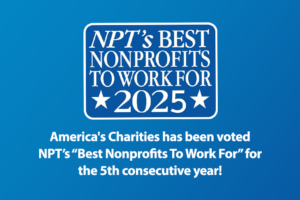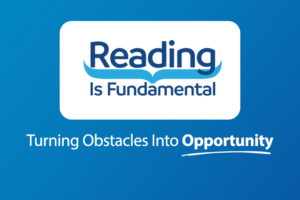Jim Starr, President and CEO, America's Charities | June 5, 2020
How Businesses Can be a Force for Good in an Era of Employee Activism
Photo by Julian Wan on Unsplash
We first published this article in 2018 in the wake of the historic Women’s March. Today, we find ourselves facing yet another profound moment in our history when people across the country are uniting around a common message. While the impetus for this tremendous occasion is different, the common thread of this article is not, so we felt it was appropriate to bring this to the fore once again.
Yet, we recognize that simply sharing tips that empower employees to support their passions is not enough – not by a mile. And America’s Charities’ inherent values compel us to speak out. The ongoing violent deaths of Black Americans and people of color are deeply disturbing. The painful impact of these harrowing deaths is and will continue to be significant, all the more so because of our keen awareness of the disproportionate impact of COVID-19 on people of color.
To be clear: America’s Charities rejects racism and racist violence, recognizing that they further encourage discrimination, hatred, oppression, and more violence. Our commitment to doing so is grounded in our action-oriented equity perspective. As a nonprofit and small business comprised of a diverse team of people committed to improving communities and building a better world, our condemnation of racist behavior and language is necessary, and we must do more. Systemic change is essential if we are going to successfully confront these issues head-on.
There are numerous organizations dedicated to such reforms, including the high-impact nonprofits below who we are proud to call our members. We encourage you to support our members that, each and every day, fight for equity, equality, and social justice, work to end racism, and provide legal counsel by donating to strive for a better world:
- ACLU
- NAACP
- NAACP Legal Defense Fund
- NBCDI National Black Child Development Institute
- NOBLE National Organization of Black Law Enforcement Executives
- Southern Poverty Law Center (SPLC)
- Thurgood Marshall College Fund (TMCF)
The following article explains how the workplace provides a unique opportunity for making long-term social change.
June is also National LGBTQ Pride Month, and we encourage you to support our members that also advocate for LGBTQ human rights. More about that here.
We are incredibly proud to support the efforts of all of our 100+ high-impact members, who each year make the world a better place: www.charities.org/charities_list
Whatever you choose to do, we hope you speak out in support of black lives. Silence is its own form of violence. I hope you will join us in peaceful anti-racism, taking actions that oppose racism as well as systemic and structural inequities.
Social activism has transformed America over the past few years. From the Women’s March to the Black Lives Matter movement; from the Arab Spring to the Climate Strike; from equal access to high-quality healthcare to fighting for social justice. The sort of activism Americans are demonstrating has moved beyond marches, social media hashtags, and town hall meetings—it has entered the workplace.
Increasingly, the imperative for employers to act as agents of positive change has become apparent. What isn’t so obvious is how employers should go about doing this. There are certainly many levels and degrees to which employers can step up and address employees’ growing demands for companies to take stands on important issues. The good news is many companies are already well-positioned to provide their employees with an outlet for their activism in a way that also aligns with the company’s core values. Outlined below are key components of such initiatives.
Six Key CSR Program Components That Empower Employees to Support Their Passions
1. Employee Giving with Charitable Choice
According to America’s Charities’ Snapshot Employee Donor Research, 76% of employee donors say the ability to choose causes they care about is very important to a positive donation experience, and 30% say the reason they choose NOT to give through the workplace is due to the fact the causes they care about are not available as choices.
By offering charitable choice through workplace giving, your company empowers its employees to funnel financial support to the social issues and nonprofits that reflect their personal values and ideologies. And by giving employees your workplace giving program as a mechanism to make those donations, you are also saving those charities valuable resources by distributing funds to them in a cost-efficient manner.
You and your employees don’t have to agree on the issues or even the best ways to affect change, but everyone should agree that supporting causes is both a smart way to advocate and a sustainable way to achieve impact.
2. Paid Time Off to Volunteer (VTO)
68% of our survey respondents say that it is imperative or very important that their employers provide them with paid time off to volunteer.
Encouraging employees to leave the office and serve the community positions your brand as caring and demonstrates its commitment to the community and social impact. And more than 70% of employees who volunteer at work report feeling better about their employer as a result, according to a 2017 UnitedHealthcare survey. While the exact number of VTO hours varies from company to company, even just offering one day of VTO can dramatically improve employee loyalty and demonstrate your company’s commitment to the community.
3. Employer Donation Matching
Whereas the open choice employee giving program we mentioned in #1 empowers employees to support nonprofits that match their passions, offering to match those employees’ donations is a great way for your company to communicate to employees that “we value and support YOU—regardless of your favorite charities or personal ideologies.” If giving enables your employees’ activism—and is in effect your organization’s own advocacy—then matching their donations goes the extra step by matching their passions with deeper (financial) support from the organization. It also looks great for your company’s social impact.
58% of America’s Charities’ Snapshot Employee Donor Research respondents say it is imperative or very important that the company match employees’ personal donations with corporate funds. If you’re looking for some programs to model yours after, here are ten well-known companies doing it right. You don’t have to be a Fortune 500 to offer matching gifts though. Between America’s Charities’ suite of four employee giving technology options and funds management services, we can empower companies large and small to support their employees and show their commitment to the community.
4. Dollars for Doers Volunteer Grants
Employees view their employers as facilitators and multipliers for their own philanthropic efforts, with 47% of survey respondents saying it is important for the company to provide a grant to the nonprofit in recognition of the employees’ volunteer service.
This unique policy takes VTO a step further and can help companies provide employees with a sense of meaning at work. While your company isn’t necessarily paying its employees time off to volunteer, through a Dollars for Doers program your company agrees to match each employees’ hours of volunteering with a set monetary donation.
5. Employee Affinity Groups or Employee Resource Groups (ERG)
Known by many names—caucuses, councils, or networking groups—ERGs serve social functions and provide a source of support for employees who share common interests, goals, or ideologies. Today many large companies have ERGs for employees of color, LGBTQ employees, women, and so on with the goal of making the workplace more inclusive and supportive of diversity.
Innovative companies can use ERGs as a way to facilitate a safe, constructive dialogue in the workplace where employees can go beyond debate and focus on discussing actionable ways to address and solve major social issues including gun violence, climate change, mental health, and sexual harassment.
6. Leadership Buy-in
One of the top six trends America’s Charities’ Snapshot Employer Research revealed is that without leadership support, employee engagement programs are likely to lack authenticity and fail. Employees are keenly aware if leadership at all levels is authentically involved or not. It’s not enough to say giving of time, money, and skills are important. Leadership must be involved in those efforts as well. Employee engagement and workplace giving programs must be embedded in a company’s culture, values, and actions. You need to look no further than the Google employee walk-out for proof of this. Download our free brief to learn how to build buy-in from leadership.
The rise of employee activism presents new challenges for companies in striking the right balance between engaging their employees in issues that matter to them, staying true to their corporate mission and values, and being a force for social good. Leveraging your employee giving and volunteer programs and other efforts provide a platform to give your employees a voice in addressing the social causes that matter to them.

Get Resources and Insights Straight To Your Inbox
Explore More Articles
For Fifth Consecutive Year America’s Charities Named ‘Best Nonprofit To Work For’
Washington, D.C. – April 1, 2025 – America’s Charities, the nonprofit that mobilizes the power of giving as a leading provider of volunteering, workplace giving,…
Read ArticleWorkplace Fundraising + Volunteering Summit (April 2nd and 3rd, 2025)
Join us in attending this virtual summit! The America’s Charities team is joining up with other leading voices in the workplace giving space for a…
Read ArticleThe Time to Act is Now
The results of the 2024 National Assessment of Educational Progress (NAEP) are in, and the findings are, in a word, heartbreaking. This assessment serves as…
Read ArticleGet Resources and Insights Straight To Your Inbox
Receive our monthly/bi-monthly newsletter filled with information about causes, nonprofit impact, and topics important for corporate social responsibility and employee engagement professionals, including disaster response, workplace giving, matching gifts, employee assistance funds, volunteering, scholarship award program management, grantmaking, and other philanthropic initiatives.




